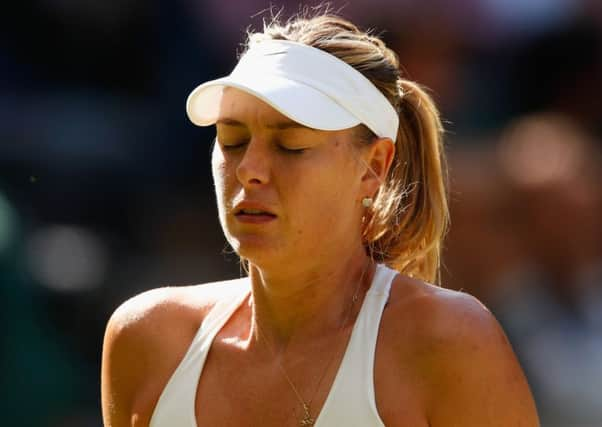Maria Sharapova admits to failed drugs test at Australian Open


The 28-year-old Russian tested positive for a substance called meldonium following her quarter-final defeat against American Serena Williams in January.
Meldonium, which Sharapova said she had legally taken throughout her career, was placed on the banned list by the World Doping Anti-Agency (WADA) at the beginning of the year, having been part of its monitoring program throughout 2015.
Advertisement
Hide AdAdvertisement
Hide AdSharapova claimed she did not realise the substance was illegal, but took “full responsibility” for her actions. The ITF said Sharapova, who now faces a ban from the sport, had been informed of the positive test on March 2 and she will be provisionally suspended from March 12.
However, Shamil Tarpishchev, president of the Russian Tennis Federation, told Russian news agency TASS he expected Sharapova to be available for this summer’s Rio Olympics after describing the positive test as “nonsense”.
Sharapova was dressed all in black as she made the shocking revelation at a pre-arranged press conference at a downtown Los Angeles hotel on Monday.
She said: ‘’I let my fans down, I let the sport down that I have been playing since the age of four and I love so deeply.
“I know with this I face consequences and I don’t want to end my career this way and I really hope I will be given another chance to play this game.”
Sharapova claimed she was prescribed meldonium, also known as mildronate, by her doctor in 2006 to deal with health issues such as an irregular heartbeat and a history of diabetes in her family.
But the substance was added to the banned list on January 1 of this year because WADA said there was ‘’evidence of its use by athletes with the intention of enhancing performance’’.
Sharapova added: “For the past 10 years I have been given a medicine called mildronate by my family doctor and a few days ago after I received the ITF letter I found out that it also has another name of meldonium which I did not know.
Advertisement
Hide AdAdvertisement
Hide Ad“It is very important for you to understand that for 10 years this medicine was not on WADA’s banned list and I had legally been taking the medicine for the past 10 years.
“But on January 1st the rules had changed and meldonium became a prohibited substance which I had not known. I failed the test and I take full responsibility for it.’’
The Russian added that she received a letter from WADA in December to inform her of the prohibited substances for 2016, but admitted she did not look at the list.
Sharapova said she did not know the extent of the action she will now face from the ITF, but Tarpishchev told TASS he expects the 28-year-old to be available to represent her country in Rio.
“I think that it’s nonsense,” Tarpishchev said. “Athletes take what their physiotherapists advise them. I believe that Sharapova will still have a chance to play at the Olympics though we will see how things are going to develop.”
Russia are currently banned from international athletics competitions by the IAAF following a string of doping offences.
Ahead of the news conference in Los Angeles, Sharapova’s team said there would be a ‘’major announcement” - leading to suggestions the Russian may announce her retirement from the sport.
“I know many of you thought I was retiring but if I was ever going to announce my retirement it would probably not be in a downtown Los Angeles hotel with this fairly ugly carpet,” she said at the press conference.
Advertisement
Hide AdAdvertisement
Hide AdSharapova won her first grand slam as a 17-year-old at Wimbledon in 2004 and has since landed the 2006 US Open title, the 2008 Australian Open and the French Open twice, in 2012 and 2014
The highest-paid female athlete in world sport for the last 11 years, according to Forbes, Sharapova has earned a large part of her income through sponsor endorsements and has her own sweet business, Sugarpova.
Steve Simon, chief executive for the WTA, said: ‘’I am very saddened to hear this news about Maria. Maria is a leader and I have always known her to be a woman of great integrity.
“Nevertheless, as Maria acknowledged, it is every player’s responsibility to know what they put in their body and to know if it is permissible.
“This matter is now in the hands of the Tennis Anti-Doping Program and its standard procedures. The WTA will support the decisions reached through this process.”